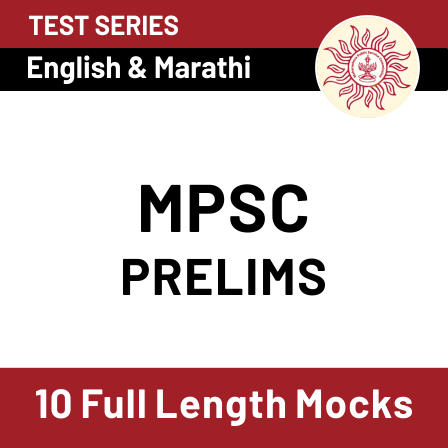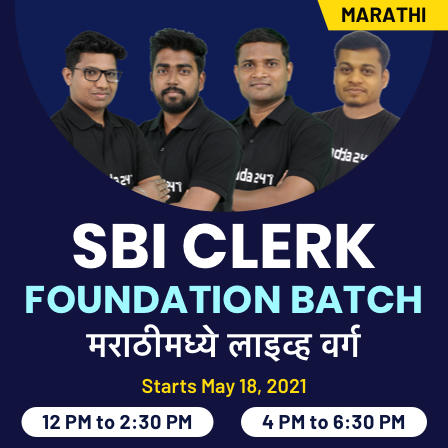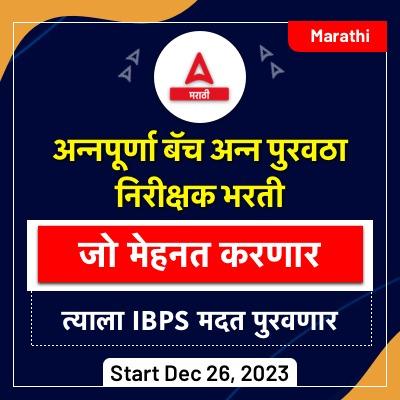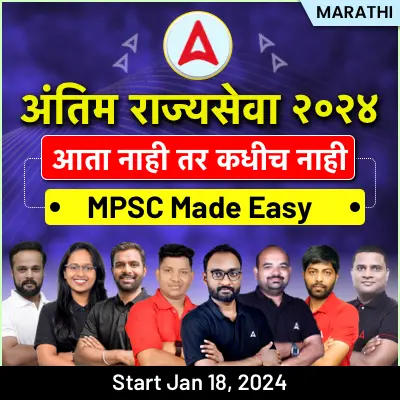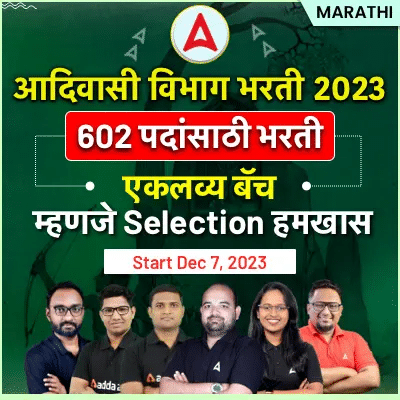
पॉलिटी दैनिक क्विझ मराठीमध्ये: 12 मे 2021
महाराष्ट्र राज्य लोकसेवा आयोग दरवर्षी वेगवेगळ्या परीक्षे मार्फत हजारो विद्यार्थ्यांची भरती करून घेते MPSC State Service, MPSC Group B, MPSC Group C, Saral Seva Bharati, Talathi, UPSC, SSC, RRB अशा अनेक परीक्षांमार्फत हजारो जागांची भरती दरवर्षी निघते ज्यात लाखो इच्छुक हजार किंवा त्याहूनही कमी जागांसाठी अर्ज करतात. आपण एमपीएससी आणि इतर परीक्षाची तयारी करत असाल तर आपल्याला क्विझ देण्याचे महत्त्व माहित असलेच पाहिजे. बर्याच विद्यार्थ्यांना अभ्यासाचे पुरेसे तास दिले जात असतानाही त्यांना या परीक्षांची पूर्तताही करता आली नाही कारण ते त्यांचे परीक्षण वेळेवर पूर्ण करू शकत नाहीत आणि संशोधन करण्याचा उत्तम मार्ग म्हणजे त्या संबंधित विषयाची किंवा विषयाची क्विझ देणे कारण आपण या मार्गाने कव्हर करू शकता कमी वेळात जास्तीत जास्त विषय. आम्हाला Add 247 मराठी येथे चांगल्या अभ्यास सामग्रीचे मूल्य समजले आहे आणि म्हणूनच आम्ही सर्व विषयांसाठी आपल्याला क्विझ प्रदान करीत आहोत. दैनिक क्विझ देऊन तुम्ही तुमच्या तयारीची पातळी तपासू शकता.
चालू घडामोडी, भूगोल, अर्थशास्त्र, पर्यावरण, सामान्य विज्ञान, इतिहास, पॉलिटी अशा सर्व स्पर्धात्मक सामान्य अभ्यास विषयांमध्ये पॉलिटीचाही तेव्हडाच महत्वाचा वाटा आहे. तर चला पॉलिटी बद्दल तुमची तयारी तपासण्यासाठी खालील 12 मे 2021 ची पॉलिटीची दैनिक क्विझ पहा.
Q1. कलम 22 संबंधित खालील विधानांचा विचार करा
- अनुच्छेद 22 मध्ये अशी माहिती देण्यात आली आहे की सल्लागार मंडळाची शिफारस करेपर्यंत प्रतिबंधात्मक अटकेची तरतूद करणारा कोणताही कायदा 2 महिन्यांपेक्षा जास्त कालावधीसाठी एखाद्या व्यक्तीला ताब्यात घेण्यास अधिकृत करणार नाही.
- संसदेद्वारे कायद्यानुसार जास्तीत जास्त कालावधी बदलू शकतो ज्यासाठी एखाद्या व्यक्तीला प्रतिबंधात्मक नजरकैदेत ठेवता येईल
वर दिलेली कोणती विधाने बरोबर आहेत?
(a) फक्त 1
(b) फक्त 2
(c) दोन्ही 1 आणि 2
(d) 1 किंवा 2 देखील नाही
Q2. पुढील विधानांचा विचार करा
- कलम 14 सर्व लोकांना लागू आहे आणि तो केवळ नागरिकांपुरता मर्यादित नाही, तर कलम 15 फक्त नागरिकांनाच लागू आहे.
- कलम 15 हा धर्म, वंश, जाती, लिंग किंवा जन्मस्थळावरील भेदभाव मर्यादित आहे पण अनुच्छेद 14 मध्ये अशी कोणतीही तरतूद नाही
वर दिलेली कोणती विधाने बरोबर आहेत?
(a) फक्त 1
(b) फक्त 2
(c) दोन्ही 1 आणि 2
(d) 1 किंवा 2 देखील नाही
Q3. पुढील कोणत्या अधिनियमांतर्गत हायकोर्टाच्या मुख्य न्यायाधीशांनी कोणत्याही राज्यासाठी राष्ट्रपतींच्या पूर्वीच्या संमतीने कोणत्याही वेळी उच्च न्यायालयात न्यायाधीशांच्या नियुक्तीची तरतूद केली आहे
(a) कलम 240
(b) कलम 180
(c) कलम 224 अ
(d) कलम 118
Q4. विशेष रजाद्वारे अपीलासाठी सर्वोच्च न्यायालयाच्या अधिकाराविषयी खालीलपैकी कोणते विधान बरोबर आहे?
(a) सुप्रीम कोर्टाचे असे खंडपीठ मुख्य न्यायाधीश असावे जे अपील मंजूर करील.
(b) उच्च न्यायालयांना सत्र / जिल्हा न्यायालयात उप-न्यायालयीन प्रकरणात विशेष रजा देण्याचे समान अधिकार आहे.
(c) अंतिम किंवा इंटरलोक्यूटरी असो या निर्णयामध्ये अपील मंजूर केले जाऊ शकते.
(d) वरील सर्व
Q5. कलम _____ अंतर्गत सर्वोच्च न्यायालय आपल्या विवेकबुद्धीने, कोणत्याही प्रदेशात किंवा न्यायालयात किंवा न्यायाधिकरणाने, कोणत्याही प्रदेशात किंवा निर्णयाद्वारे, कोणत्याही प्रदेशात किंवा निर्णयाद्वारे अपील करण्यासाठी विशेष रजा देऊ शकेल.
(a) 132
(b) 32
(c) 146
(d) 136
Q6. . पुढील विधानांचा विचार करा
- राज्यांकडून थेट निवडून येणार्या सदस्यांची संख्या जास्तीत जास्त मर्यादा उपलब्ध करुन दिली जाते.
- प्रत्येक राज्याला लोकसभेत असंख्य जागा अशा पद्धतीने देण्यात येतील की वाटप केलेल्या संख्येचे प्रमाण आणि राज्यातील लोकसंख्या जितकी व्यवहार्य असेल तितकीच राहील.
वर दिलेली कोणती विधाने बरोबर आहेत?
(a) फक्त 1
(b) फक्त 2
(c) दोन्ही 1 आणि 2
(d) 1 किंवा 2 देखील नाही
Q7. पुढील विधानांचा विचार करा
- घटनेत केंद्रशासित प्रदेशांपासून लोकसभेसाठी थेट निवडणुकांची तरतूद आहे.
- राज्यघटनेनुसार, वीसपेक्षा जास्त सदस्य केंद्रशासित प्रदेशांचे प्रतिनिधित्व करणार नाहीत. कायद्यानुसार संसदेत प्रदान केलेल्या अशा प्रकारे निवडले जाईल.
वर दिलेली कोणती विधाने बरोबर आहेत?
(a) फक्त 1
(b) फक्त 2
(c) दोन्ही 1 आणि 2
(d) 1 किंवा 2 देखील नाही
Q8 पुढीलपैकी कोणती कार्य/ कार्ये भारताचे राष्ट्रपती करु शकतात?
(a) संसदेच्या प्रत्येक सभागृहाची बैठक
(b) संसदेचे प्रत्येक सभागृह विसर्जित करणे
(c) संसदेच्या प्रत्येक सभागृहाचे कामकाज
(d) (a) आणि (b) दोन्ही
Q9. खालीलपैकी कोणते सत्र सदन संपुष्टात आणण्याचे योग्य वर्णन करते?
(a) तहकूब
(b) प्रगती
(c) विघटन
(d) (b) आणि (c) दोन्ही
Q10 पुढील विधानांचा विचार करा
- संयुक्त बैठकीत लोकसभेचे सभापती मतदान करू शकत नाहीत परंतु राज्यसभेचे अध्यक्ष मतदान करू शकतात.
- लोकसभा आणि राज्यसभा या दोन्ही सभागृहाचे अद्याप विश्लेषण केले गेले नाही आणि सध्या ते बसले आहेत तेव्हाच संयुक्त बैठक जाहीर केली जाऊ शकते.
वर दिलेली कोणती विधाने बरोबर आहेत?
(a) फक्त 1
(b) फक्त 2
(c) दोन्ही 1 आणि 2
(d) 1 किंवा 2 देखील नाही
Solutions
S1.Ans.(b)
Sol.
Statement 1 is incorrect – Article 22 (4) provides that no law providing for preventive detention shall authorize the detention of a person for a longer period than 3 months unless an Advisory Board consisting of persons who are, or have been, or are qualified to be appointed as Judges of a High Court, has reported that there is a sufficient cause for such detention.
Statement 2 is correct – Under Article 22(7) (b) -Parliament may by law prescribe the maximum period for which any person may in any class or classes of cases be detained under any law providing for preventive detention.
S2.Ans.(c)
Sol.
It should be noted that article 15 is limited to citizens, while article 14 extends to all persons and is not limited to citizens. A corporation, which is a juristic person, is also entailed to the benefit of this article Thus statement 1 is correct.
The Principle of Equality in article 14 is the uniformity of treatment to all in all respects. It means that all persons similarly circumstanced shall be treated alike both in the privileges conferred and liabilities imposed by the laws. Thus, statement 2 is correct as article 15 states that the State shall not discriminate against any citizen on grounds only of religion, race, caste, sex, place of birth, or any of them.
S3.Ans.(c)
Sol.
Article 224A, used rarely, of the Constitution deals with the appointment of ad-hoc judges in High Courts and says “the Chief Justice of a High Court for any State may at any time, with the previous consent of the President, request any person who has held the office of a Judge of that Court or of any other High Court to sit and act as a Judge of the High Court for that State”.
S4.Ans.(c)
Sol.
Under article 136 – The Supreme Court may in its discretion grant special leave to appeal from any judgment, decree, determination, sentence, or order in any case or matter passed or made by any court or tribunal in the territory of India.
No such provision is mentioned in the constitution, any bench can grant such an appeal if necessary conditions occur and judges feel it is necessary.
article 136(2) states that nothing in clause (I) shall apply to any judgment, sentence, or order passed or made by any court or tribunal constituted by the Armed Forces.
It can be granted by the Supreme Court in any judgment whether final or interlocutory.
The high court has no such special leave grant. Article 136 is only applicable to Supreme Court.
S5.Ans.(d)
Sol.
Under article 136 – The Supreme Court may in its discretion grant special leave to appeal from any judgment, decree, determination, sentence, or order in any case or matter passed or made by any court or tribunal in the territory of India
S6.Ans.(c)
Sol.
Article 81 provides for the Composition of the House of the People.
Statement 1 is correct – the House of the People shall consist of not more than 530 members chosen by direct election from territorial constituencies in the States (this doesn’t include UTs).
Statement 2 is correct – Article 81(2) states
(a) There shall be allotted to each State a number of seats in the House of the People in such manner that the ratio between the number and the population of the State is,
so far as practicable, same for all Stales; and
(b) Each State shall be divided into territorial constituencies in such manner that the ratio between the population of each constituency and the number of seats allotted to it is, so far as practicable, the same throughout the State
S7.Ans.(b)
Sol.
according to the constitution, not more than twenty members shall represent the Union territories, chosen in such manner as Parliament may by law provide. Thus the parliament passed – The Union Territories (Direct Election to The house Of the People) Act, 1965
S8.Ans.(a)
Sol.
The President shall from time to time summon each House of Parliament to meet at such time and place as he thinks fit, but six months shall not intervene between its last sitting in one session and the date appointed for its first sitting in the next session.
The President can only dissolve the Lok Sabha but not the Rajya Sabha. An adjournment terminates the sitting of the House which meets again at the time appointed for the next sitting. An adjournment also signifies a brief break of the sitting of the House which re-assembles at the appointed time on the same day. It is done by the Speaker in Lok Sabha and Chairman in Rajya Sabha.
S9.Ans.(a)
Sol.
Prorogation means the termination of a session of the House by an order made by the President.
The President can only dissolve the Lok Sabha but not the Rajya Sabha.
An adjournment terminates the sitting of the House which meets again at the time appointed for the next sitting. An adjournment also signifies a brief break of the sitting of the House which re-assembles at the appointed time on the same day. It is done by the Speaker in Lok Sabha and Chairman in Rajya Sabha.
S10.Ans.(d)
Sol.
Statement 1 is incorrect – The ex officio chairman of Rajya Sabha is the vice president and he/she is not a member of the house and thus cannot vote.
Statement 2 is incorrect – The President may, notify to the Houses by message if they are sitting or by public notification if they are not sitting Joint sittings do not apply to money bills and constitutional amendment bills.
If at the joint sitting of the two Houses the Bill is passed by a majority of the total number of members of both Houses present and voting, the bill is deemed to pass.

